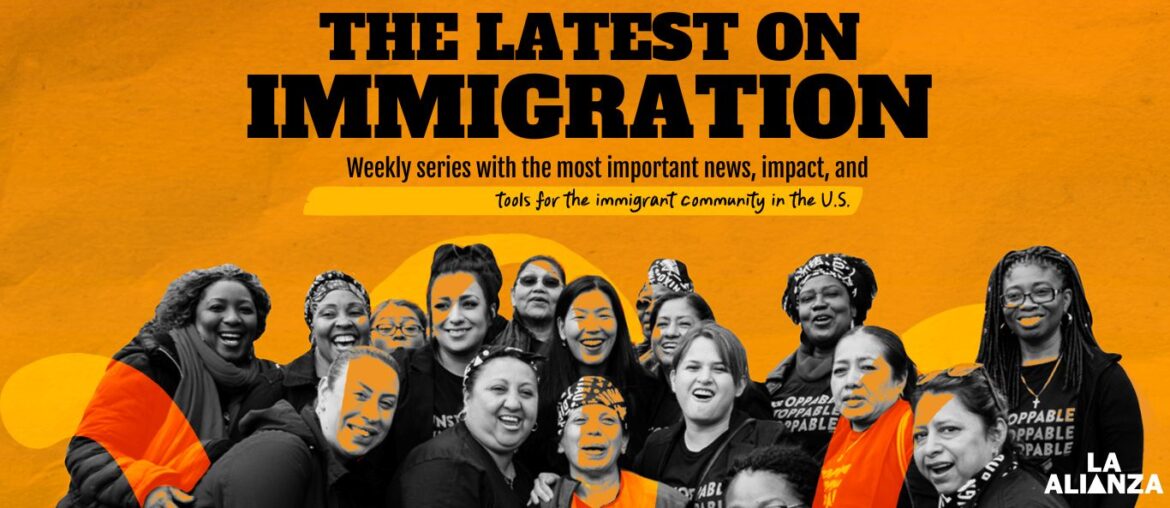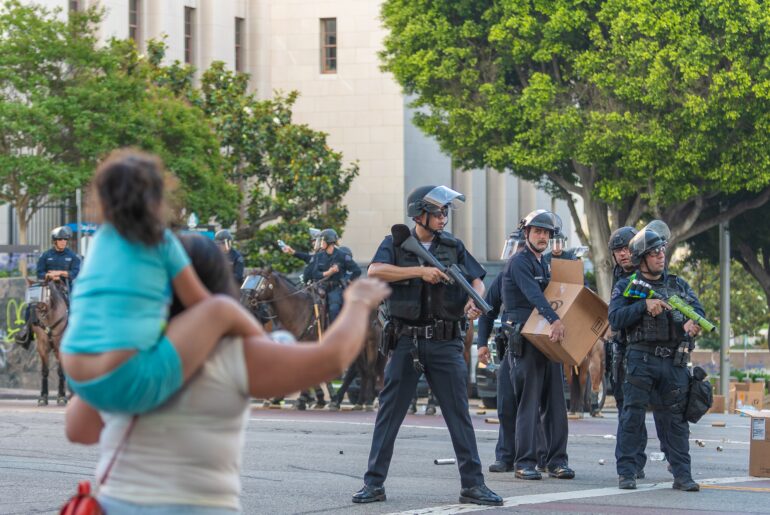This is a summary of the most relevant immigration news from June 5 to 18, 2025. In recent weeks, the US government has intensified workplace raids, eliminated humanitarian programs, and activated new immigration restrictions. Although a partial pause was announced in certain labor sectors, detentions continue and have sparked massive protests across the country. At the same time, some courts and local governments are beginning to respond with measures that seek to limit these operations. How are these decisions affecting migrant families and those who live off their daily work?
Recent news
The government announces a “partial pause” in immigration raids, but operations continue in specific sectors. The government announced a “temporary pause” for raids in essential sectors such as farms, hotels, restaurants, and meat processing plants. However, operations continue in places linked to investigations into serious crimes such as human trafficking or money laundering.
- What we know: Since June 11, ICE has conducted raids on warehouses, money transfer offices, stores, meat-packing plants, and other locations. The largest raid took place in Omaha, Nebraska, where federal agents arrested more than 70 people at a meat plant following an investigation into the use of false documents. According to reports, production at the plant fell to 30% after the arrests, and those detained were transferred out of state, making it difficult for them to access legal representation.
- Why it’s important: Although the government has announced a pause, ongoing actions show that operations have not completely ceased. Instead of a general suspension, a more selective approach is being applied, focusing on specific sectors and cases linked to federal investigations. This has created uncertainty among migrant workers who, although not directly involved in these cases, face consequences such as layoffs, loss of income, or fear of leaving their homes.
- What you can do: Experts recommend identifying an immigration lawyer and having a list of emergency contacts on hand. In addition, you can visit the National Domestic Workers Alliance’s “Know Your Rights” guide.
- Impact on immigrant communities: There has been a reported increase in job absences, with many people avoiding going to work or attending appointments for fear of being detained, leading to a reduction in the workforce, especially in sectors such as construction and cleaning. The community has begun to ask for community support due to these absences.
Record arrests during scheduled immigration appointments: On June 4, Immigration and Customs Enforcement (ICE) arrested more than 2,200 people across the country, marking the highest number of arrests recorded in a single day. Many of these individuals had attended scheduled appointments at immigration offices as part of the Alternatives to Detention (ATD) program, which allows for the monitoring of individuals without the need for physical detention.
- What we know: Some immigrants received text messages notifying them of early check-ins, and upon arrival, they were arrested. Immigration lawyers have denounced this method as sowing mistrust, even among those who were complying with legal requirements.
- Why it’s important: Experts have described the use of these methods as a “trap” that undermines trust in the system. There are fears that it will increase the number of people who avoid attending hearings or check-ins for fear of being detained.
- What you can do: It is recommended that you attend legal appointments with someone accompanying you, if possible, and consult with a lawyer before appearing. You can access the National Domestic Workers Alliance’s directory of lawyers. There, you can find information on where to access legal help near your home. It is also helpful to have a family emergency plan and keep important documents accessible.
New executive order imposes travel restrictions on people from 19 countries: On June 9, a new travel ban signed by President Trump went into effect, affecting citizens of 12 countries, including Afghanistan, Iran, Somalia, Yemen, Haiti, Cuba, and Venezuela, and establishing additional restrictions for seven others. Although previously issued visas have not been revoked, the measures have tightened controls at points of entry into the country.
- What we know: Authorities are conducting additional interviews with people with valid visas, and multiple cases of inadmissibility have been reported at airports. Immigration lawyers and community organizations have noted that uncertainty has increased among students, workers, and people with family plans.
- Why it’s important: The measure directly affects family, academic, and work travel. It also limits the entry of new international students and could affect visa renewals for those who need to leave the country temporarily. Although authorities have indicated that those already in the US can remain if they have valid visas, the future of their immigration status is uncertain.
- What you can do: Before traveling, it is recommended to check the updated requirements on the official CBP website.
- Impact on immigrant communities: Some people have canceled trips for fear of not being able to re-enter or being detained.
DHS cancels humanitarian parole program for citizens of Cuba, Haiti, Nicaragua, and Venezuela: On June 12, the Department of Homeland Security (DHS) began sending notices of cancellation of CHNV parole to more than 500,000 people who entered the US under that program. The measure eliminates their temporary stay permits and also invalidates their work authorizations.
- What we know: Those affected received a letter informing them that they must leave the country immediately if they do not have another valid immigration status.
- Why it matters: The program was key to the legal and controlled arrival of people from countries in humanitarian crisis. Its elimination represents a major shift in federal immigration policy.
- What they can do: People in the process of deportation should seek immediate legal advice and stay tuned for court updates.
- Impact on immigrant communities: Many people now face uncertainty about their legal future and fear being detained if they fail to change their status in time.
Developing Stories and Local News
These are stories and legislation that are developing or in the pipeline. Details could change:
- Trump orders increased deportations in Democratic cities: President Donald Trump has asked ICE to prioritize deportations in cities such as Los Angeles, Chicago, and New York, which he described as “the heart of Democratic power.” The order comes after a series of nationwide protests against immigration raids.
- Mass protests after raids in Los Angeles and military deployment: The raids in that city and the deployment of more than 4,000 National Guard troops and 700 Marines sparked demonstrations under the slogan “No Kings” in more than 1,500 cities across the country. It is estimated that more than 5 million people participated and that more than 520 were arrested in Los Angeles alone. In some cities, clashes with police and the use of tear gas were reported. It represents the largest mobilization on immigration issues in nearly two decades.
- Migrants escape from detention center in New Jersey: At least four people escaped from the Delaney Hall center. The incident comes after reports of unrest over poor food conditions. Federal authorities have not issued any official statements.
- Student’s detention revives fears among Dreamers: Ximena Arias-Cristobal, 19, was detained after a wrongful traffic stop in Georgia. She spent more than two weeks in detention before being released. Her case reflects the growing risks for young people without DACA.
- Tense debate between governors and Congress over immigration policies: The governors of New York, Illinois, and Minnesota defended their policies against accusations of obstructing ICE. The hearing coincided with raids and protests in multiple cities.
The numbers
- Daily arrests exceeded 2,000 on some days in June. In total, ICE has made more than 100,000 arrests so far this year, far exceeding previous levels.
- ICE increased its internal daily arrest targets from 1,000 to 3,000, including workplace raids.
- More than 5,000 agents from other federal agencies have been assigned to reinforce ICE operations.
- Approximately 51,000 undocumented immigrants remain in ICE custody.
Resources
- For more help, visit the National Domestic Workers Alliance’s “Know Your Rights” hub. It includes immigrants’ rights, immigration options, and a legal aid directory, among other resources. To access the information, visit ndwa.us/immigrant.
Note: The National Domestic Workers Alliance is the partner organization of La Alianza
- To identify reliable information, visit: How to identify fake news about immigration and avoid misinformation.
Legal Disclaimer: This information is provided for educational purposes and does not constitute legal advice. It is recommended that you consult with an immigration attorney to assess your specific situation.





